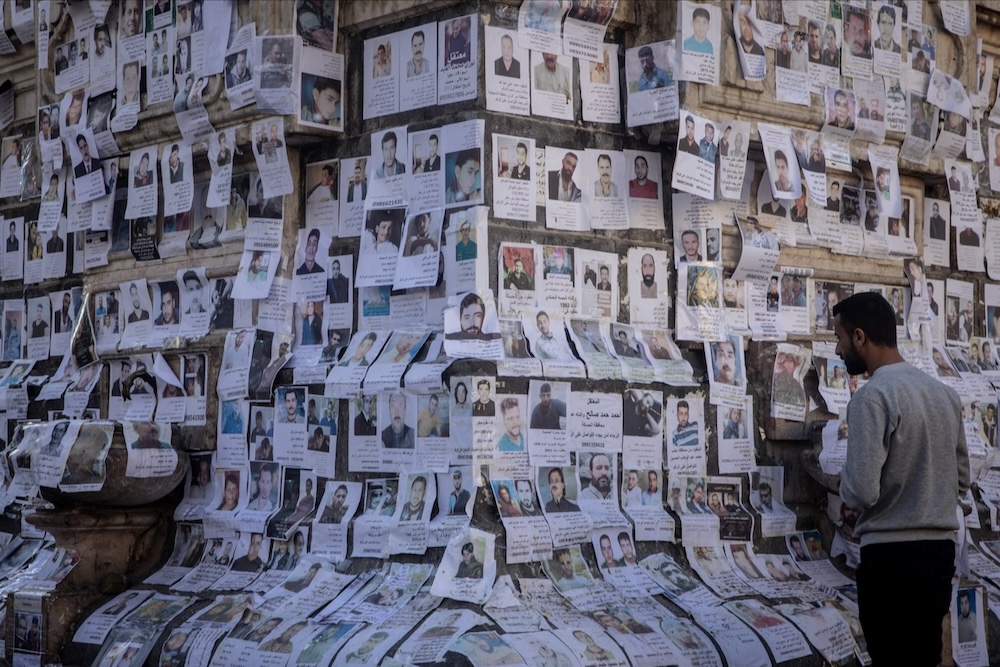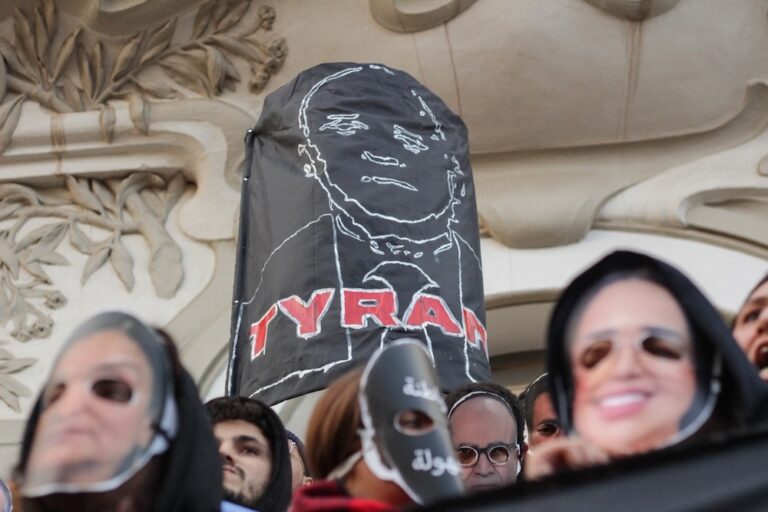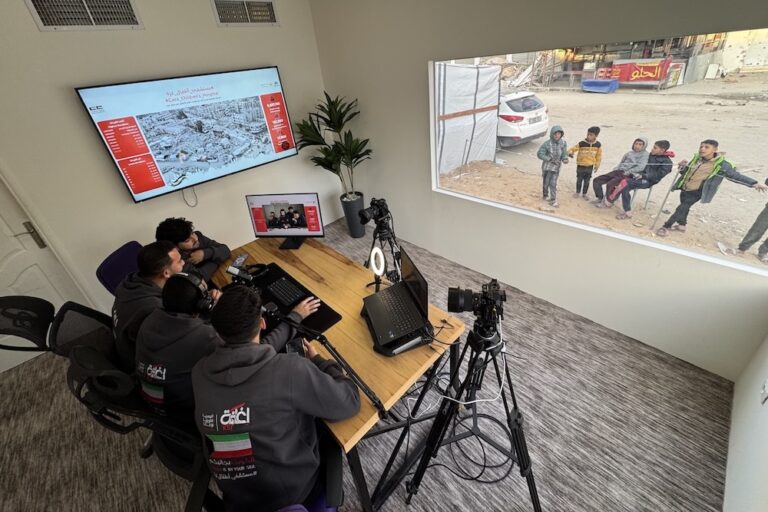December 2024 in MENA: A free expression and civic space round-up produced by IFEX's Regional Editor Naseem Tarawnah, based on IFEX member reports and news from the region.
Syria embarks on a challenging path to justice after Assad’s downfall; genocide allegations and media suppression intensify in Palestine; Egypt cements repression with new laws and crackdowns; journalists face mounting threats in Lebanon, Sudan, and beyond.
Finding justice in Syria’s new chapter
The fall of Bashar al-Assad’s regime on 8 December marked a historic turning point for Syria, ending decades of corruption, and brutal repression. After nearly 14 years of conflict that left over 600,000 dead and displaced millions, the road ahead remains fraught with challenges.
The Syrian Center for Media and Freedom of Expression (SCM) and other IFEX members celebrated the historic moment, affirming the opportunity it provides to rebuild a Syria rooted in justice, dignity, and human rights.
Rights groups stress the need for comprehensive, transparent, and inclusive transitional justice measures to address atrocities and foster national reconciliation. SCM and the Gulf Centre for Human Rights (GCHR) stress that the transitional government must uphold civil liberties, ensure equality, and respect Syria’s cultural and ethnic diversity.
Optimism about Syria’s future is tempered by the complexities of governance in a fractured nation controlled by Hayat Tahrir al-Sham (HTS), a militant group with a record of severe human rights abuses.
Journalists were among those most targeted by Assad’s repression. Over 181 have been killed since 2011, and at least 23 were behind bars at the time of the regime’s fall. They symbolise both the costs of the past, and the hope for Syria’s future. IFEX members are calling for a thorough reckoning with the regime’s war crimes against the media.
In December, the killing of journalists Anas Alkharboutli and Mustafa al-Kurdi in the weeks leading up to Assad’s downfall and the deaths of two Kurdish journalists, Nazım Daştan and Cihan Bilgin, hit by a Turkish drone strike while reporting in northern Syria, were fresh reminders of the violent legacy of the conflict.
The release of prisoners of conscience, including blogger Tal Al-Mallouhi who was arrested in 2009, offers a glimmer of hope, though the transition remains fragile. Lama Fakih of Human Rights Watch (HRW) warns that rebuilding trust will require rejecting the “horror show of the past” and laying the groundwork for a society where human dignity is paramount.
The discovery of mass graves is gradually revealing the scale of atrocities committed during the conflict. HRW stressed the importance of preserving these sites to prevent tampering and support forensic investigations, which are crucial for holding perpetrators accountable and providing closure to the families of the disappeared.
“Without immediate Syrian and international efforts to secure and preserve likely sites of mass crimes for coordinated exhumations and forensic investigations, there is a serious risk that critical evidence for accountability will be lost. The loved ones of people so brutally killed here deserve to know what happened to them. The victims deserve accountability.”
Hiba Zayadin, senior MENA researcher at HRW
Palestine: Genocide, crackdowns and censorship
In the final weeks of the year, human rights groups amplified a growing consensus that Israel’s actions in the Gaza Strip amount to genocide. An HRW report detailed how Israeli authorities have systematically obstructed Palestinians’ access to sufficient water for survival in Gaza, while an Amnesty International investigation concluded that “Israel has unleashed hell and destruction on Palestinians in Gaza brazenly, continuously, and with total impunity.”
With attacks ongoing, Israeli forces killed more Palestinian journalists last month. The Palestinian Center for Development and Media Freedom (MADA) condemned the killing of five journalists from the “Al-Quds Today” TV channel, who were targeted while reporting in Gaza. This followed the killing of Al-Jazeera cameraman Ahmad al-Louh on 15 December and other journalists such as Mohammed Balousha and Mohammed Jaber al-Qarinawi.
According to RSF, 96% of journalists in northern Gaza have been forcibly displaced from their homes, leaving media workers at extreme risk as they attempt to report on the ongoing ethnic cleansing in a growing news void.
The Palestinian Authority (PA) also intensified its crackdown on free expression in the occupied West Bank, exacerbating the suppression of Palestinian voices amid rising Israeli settler attacks there. Following Al-Jazeera’s coverage of a standoff in Jenin, the PA temporarily banned the channel’s operations, mirroring a similar move by Israeli authorities last year.
The Palestinian Digital Rights Coalition (PDRC) condemned the PA’s suspension of Al-Jazeera and other measures against the media, calling attention to the grave attack on press freedom and the right to information amid the violence.
According to the coalition, reports and videos circulating on social media reveal widespread harassment and intimidation of Palestinians for their online expression, with authorities forcing individuals to produce “apology videos” under duress and using other tactics to silence dissent.
MADA’s monthly report noted that Palestinian authorities were responsible for 30% of all violations against journalists in December, alongside the litany of abuses by Israeli authorities.
A new report by the Arab Center for the Advancement of Social Media (7amleh) detailed how Meta has continuously silenced online pro-Palestinian voices. Testimonies revealed widespread content deletions and account suspensions, while hate speech targeting Palestinians has proliferated unchecked.
“The continued discriminatory practices by Meta against Palestinian content constitute a clear violation of international standards for freedom of expression,” said Jalal Abukhater, Advocacy Manager at 7amleh, calling on Meta to take serious and urgent steps to reform its policies and ensure Palestinians’ right to use digital platforms without suppression or discrimination.”
The cultural toll has been equally devastating. PEN International honoured 13 Palestinian writers and poets killed between October and December 2023, underscoring the profound impact on Gaza’s cultural heritage and the continued struggle for free expression.
Egypt’s blueprint for perpetual repression
Ahead of Egypt’s Universal Periodic Review (UPR) on 28 January, the country’s human rights situation continues to draw international scrutiny. A joint report from 13 human rights organisations sheds light on the escalating repression over the past five years, with the authorities criminalising political participation and violating fundamental rights.
The 2023 presidential elections marked a critical point in these abuses, as opposition candidates and their supporters were targeted, while violations like torture, enforced disappearances, and crackdowns on free assembly intensified. Women’s rights, conditions in Sinai, and the persecution of activists abroad were also identified as areas of concern.
High-profile cases from among the country’s thousands of political prisoners illustrate the severity of the ongoing repression. Human rights lawyer Hoda Abdelmonem, targeted by authorities, faces repeated frivolous charges to justify her prolonged, arbitrary pretrial detention, despite having completed previous sentences. Poet Galal El-Behairy, jailed for his activism, also continues to face threats of torture and denial of medical care.
Prominent activist and writer Alaa Abd el-Fattah, imprisoned since 2019, remains another focal point for human rights groups continuing to press authorities for his release. His mother, Laila Soueif, has been on a hunger strike for over 100 days, demanding her son’s freedom.
As the crackdown deepens, the Egyptian government is pushing through a controversial new Code of Criminal Procedures. Critics warn that the draft law would further entrench authoritarian rule by legitimising security forces’ abuses and undermining legal accountability.
Amna Guellali, Research Director at Cairo Instute for Human Rights Studies (CIHRS), argues, “Far from addressing systemic abuses, the new draft codifies practices that undermine fair trial guarantees, shield security forces from accountability, and fails to provide guarantees preventing indefinite pretrial detention.”
In another striking example of the ongoing repression, the directors of the Egyptian Initiative for Personal Rights (EIPR) continue to face travel bans and asset freezes four years after their release from prison. Despite no evidence to support charges of “terrorism” or “spreading false news,” they remain unable to resume their work.
In Brief
Algeria: Algerian novelist Boualem Sansal remains detained without access to family or legal counsel since his November arrest, sparking concerns about his rights and freedom of expression. He faces national security charges under a law often used to silence critics. PEN International has called for his immediate release.
Bahrain: Protests erupted in Bahrain’s Jau Prison after a political prisoner died from medical neglect. Inmates faced violent crackdowns and deprivation, while critically ill prisoners were denied medical care. Demonstrations across Bahrain called for the release and proper treatment of detainees. Notably, Bahrain’s royal pardon excluded nearly all political prisoners, including Abdulhadi Al-Khawaja, who has now endured 5,000 days of arbitrary detention.
Kuwait: Iraq’s extradition of Kuwaiti blogger Salman Al-Khalidi to Kuwait raises serious concerns about his safety. Al-Khalidi, a political refugee in the UK, is known for advocating for civil rights and criticizing governments in the region. He faces imprisonment in Kuwait on charges related to his online activism and anti-government views. According to GCHR, the extradition violates international protections for refugees and exposes him to further persecution.
Lebanon: A new GCHR report reveals the severe dangers journalists face in the war in Lebanon, including targeted killings, physical attacks, and online harassment. Despite protections under international law, journalists have been bombed, vilified, and forced into self-censorship. The report urges immediate international action to ensure journalists’ safety and uphold their right to report the truth.
Saudi Arabia: Ahead of the 2024 Internet Governance Forum (IGF), held in December, human rights organisations called on Saudi Arabia to release prisoners of conscience detained for online expression and to improve transparency, as concerns over digital repression mount. GCHR reported on the recent release of several prominent human rights defenders following prolonged imprisonment, including Dr. Mohammed Fahad Al-Qahtani, Issa Al-Nukhaifi, Dr. Malik Al-Ahmad, Mohammed Al-Khudairi, and Mohammed Al-Habdan.
Sudan: Journalist Hanan Adam and her brother were killed by Rapid Support Forces (RSF) at their home in al-Gezira state on 8 December, raising alarms about the safety of journalists in Sudan’s civil war. CPJ condemned the killings and urged Sudanese authorities to investigate, highlighting the targeting of Adam for her work with al-Midan and the Ministry of Culture and Information.
Lastly, marking the International Day of Persons with Disabilities, ARTICLE 19 called on Tunisia to prioritise an inclusive digital transformation that ensures equal access to information for people with disabilities (PWDs). It emphasised the need for authorities to address the environmental and institutional barriers hindering access, especially as public administration moves toward digitalization. Additionally, it urged collaboration with civil society to foster greater participation by PWDs in public life.



